Orléans–Montauban railway
The railway from Orléans to Montauban is an important French 544-kilometre long railway line, that connects Orléans and northern France to Montauban and southern France via Limoges. The railway was opened in several stages between 1847 and 1893, when the section from Limoges to Brive-la-Gaillarde was finished.[3][4]
| Orléans–Montauban railway | |
|---|---|
 Viaduc SNCF de Souillac France | |
| Overview | |
| System | SNCF |
| Status | Operational |
| Locale | France (Centre-Val de Loire, Nouvelle Aquitaine, Occitanie) |
| Termini | Gare des Aubrais Gare de Montauban-Ville-Bourbon |
| Operation | |
| Opened | 1847-1893 |
| Owner | RFF |
| Operator(s) | SNCF |
| Technical | |
| Line length | 544 km (338 mi) |
| Number of tracks | Double track[1] |
| Track gauge | 1,435 mm (4 ft 8 1⁄2 in) standard gauge |
| Electrification | 1.5 kV DC[2] |
Route
The Orléans–Montauban railway leaves the Gare des Aubrais, entering its terminus Gare de Montauban-Ville-Bourbon after a total length of 544 km.
Main stations
The main stations on the Orléans–Montauban railway are:
- Gare des Aubrais
- Gare de Vierzon-Ville
- Gare de Châteauroux
- Gare de Limoges-Bénédictins
- Gare de Brive-la-Gaillarde
- Gare de Montauban-Ville-Bourbon
History
The section Orléans–Châteauroux was built and exploited by the Compagnie du Centre, that became part of Chemin de Fer de Paris à Orléans in 1852. The PO extended the railway afterwards.[5] The first section that was opened in 1847 led from Orléans (on the existing line from Paris to Tours) to Châteauroux. The line was extended to Argenton-sur-Creuse in 1854. Limoges was reached in 1856.[3]
The opening of the Limoges–Périgueux railway (1861), the Périgueux–Brive-la-Gaillarde section of the Coutras–Tulle railway (1860) and the Brive-la-Gaillarde–Toulouse railway (1858-1864) offered a much shorter connection between Paris and Toulouse than the existing line via Tours and Bordeaux.[3] The opening of the Nexon–Brive-la-Gaillarde railway in 1875 shortened the distance by 69 km.[4]
The distance between Paris and Toulouse was shortened by a further 42 km by the opening of the Limoges–Montauban section of the Orléans–Montauban railway, in three stages: Cahors–Montauban in 1884, Brive-la-Gaillarde–Cahors in 1891, and finally Limoges–Brive-la-Gaillarde via Uzerche in 1893.[4]
Services
The Orléans–Montauban railway is used by the following passenger services:
- TGV on the section between Orléans and Brive-la-Gaillarde
- Intercités from Bordeaux to Lyon on the section between Limoges and Saint-Sulpice-Laurière, and from Paris to Toulouse on the whole line
- TER Centre-Val de Loire, TER Nouvelle-Aquitaine and TER Occitanie regional services on the whole line
References
| Wikimedia Commons has media related to Ligne des Aubrais - Orléans à Montauban-Ville-Bourbon. |
- "RFF - Network map" (PDF). Archived from the original (PDF) on 2011-07-18.
- "RFF - Map of electrified railway lines" (PDF).
- Direction Générale des Ponts et Chaussées et des Chemins de Fer (1869). Statistique centrale des chemins de fer. Chemins de fer français. Situation au 31 décembre 1869 (in French). Paris: Ministère des Travaux Publics. pp. 146–160.
- Banaudo, José (2003). Sur les rails du Limousin (in French). Editions de Borée. p. 4.
- Joanne, Adolphe (1859). Atlas historique et statistique des chemins de fer français (in French). Paris: L. Hachette. p. 39.